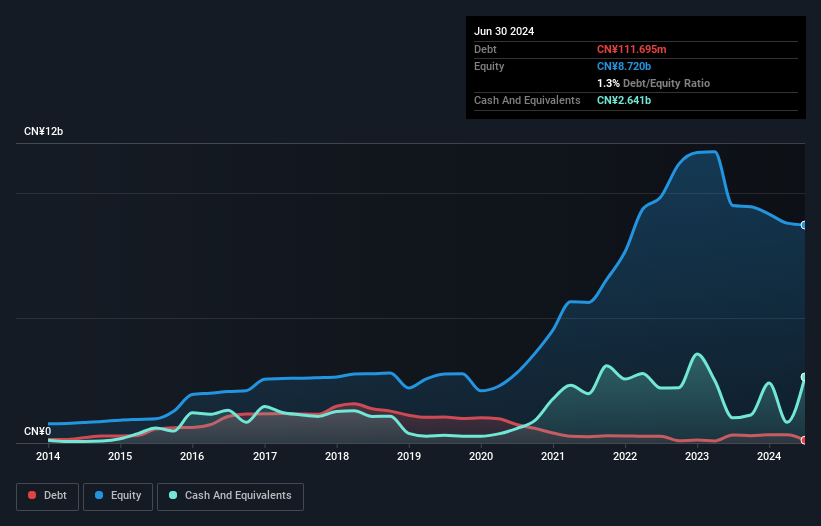Health Check: How Prudently Does Daan Gene (SZSE:002030) Use Debt?

The external fund manager backed by Berkshire Hathaway's Charlie Munger, Li Lu, makes no bones about it when he says 'The biggest investment risk is not the volatility of prices, but whether you will suffer a permanent loss of capital.' So it might be obvious that you need to consider debt, when you think about how risky any given stock is, because too much debt can sink a company. As with many other companies Daan Gene Co., Ltd. (SZSE:002030) makes use of debt. But should shareholders be worried about its use of debt?
When Is Debt Dangerous?
Debt is a tool to help businesses grow, but if a business is incapable of paying off its lenders, then it exists at their mercy. Ultimately, if the company can't fulfill its legal obligations to repay debt, shareholders could walk away with nothing. However, a more common (but still painful) scenario is that it has to raise new equity capital at a low price, thus permanently diluting shareholders. By replacing dilution, though, debt can be an extremely good tool for businesses that need capital to invest in growth at high rates of return. The first thing to do when considering how much debt a business uses is to look at its cash and debt together.
See our latest analysis for Daan Gene
What Is Daan Gene's Debt?
The image below, which you can click on for greater detail, shows that Daan Gene had debt of CN¥111.7m at the end of June 2024, a reduction from CN¥323.8m over a year. But on the other hand it also has CN¥2.64b in cash, leading to a CN¥2.53b net cash position.

A Look At Daan Gene's Liabilities
According to the last reported balance sheet, Daan Gene had liabilities of CN¥1.26b due within 12 months, and liabilities of CN¥143.4m due beyond 12 months. On the other hand, it had cash of CN¥2.64b and CN¥2.02b worth of receivables due within a year. So it actually has CN¥3.26b more liquid assets than total liabilities.
This luscious liquidity implies that Daan Gene's balance sheet is sturdy like a giant sequoia tree. With this in mind one could posit that its balance sheet means the company is able to handle some adversity. Simply put, the fact that Daan Gene has more cash than debt is arguably a good indication that it can manage its debt safely. There's no doubt that we learn most about debt from the balance sheet. But it is Daan Gene's earnings that will influence how the balance sheet holds up in the future. So when considering debt, it's definitely worth looking at the earnings trend. Click here for an interactive snapshot.
Over 12 months, Daan Gene made a loss at the EBIT level, and saw its revenue drop to CN¥1.0b, which is a fall of 82%. To be frank that doesn't bode well.
So How Risky Is Daan Gene?
While Daan Gene lost money on an earnings before interest and tax (EBIT) level, it actually generated positive free cash flow CN¥456m. So although it is loss-making, it doesn't seem to have too much near-term balance sheet risk, keeping in mind the net cash. We'll feel more comfortable with the stock once EBIT is positive, given the lacklustre revenue growth. When we look at a riskier company, we like to check how their profits (or losses) are trending over time. Today, we're providing readers this interactive graph showing how Daan Gene's profit, revenue, and operating cashflow have changed over the last few years.
At the end of the day, it's often better to focus on companies that are free from net debt. You can access our special list of such companies (all with a track record of profit growth). It's free.
New: Manage All Your Stock Portfolios in One Place
We've created the ultimate portfolio companion for stock investors, and it's free.
• Connect an unlimited number of Portfolios and see your total in one currency
• Be alerted to new Warning Signs or Risks via email or mobile
• Track the Fair Value of your stocks
Have feedback on this article? Concerned about the content? Get in touch with us directly. Alternatively, email editorial-team (at) simplywallst.com.
This article by Simply Wall St is general in nature. We provide commentary based on historical data and analyst forecasts only using an unbiased methodology and our articles are not intended to be financial advice. It does not constitute a recommendation to buy or sell any stock, and does not take account of your objectives, or your financial situation. We aim to bring you long-term focused analysis driven by fundamental data. Note that our analysis may not factor in the latest price-sensitive company announcements or qualitative material. Simply Wall St has no position in any stocks mentioned.
About SZSE:002030
Daan Gene
Researches and develops, manufactures, and sells clinical test reagents, instruments, and supporting consumables in China.
Excellent balance sheet minimal.

